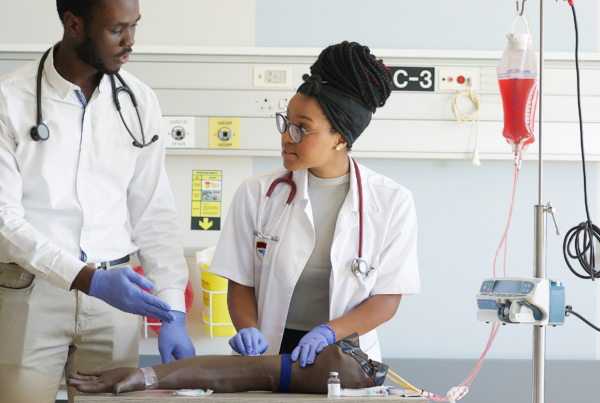Are you ready to kickstart your healthcare career with Phlebotomy Now? Navigating the complex landscape of phlebotomy credentials can be daunting, especially when it comes to understanding the difference between a “Phlebotomy License vs Certification.” But don’t worry—Phlebotomy Now is here to help you with this important decision. Understanding these distinctions is essential for making informed choices about your future in phlebotomy, ensuring you meet the necessary standards for employability and patient care.
In the world of healthcare, phlebotomists are key in collecting and processing blood samples. Those starting their phlebotomy career often wonder if they should get a license or a certification. Both options seem similar but have big differences that affect their job chances and growth.
| Key Takeaways |
| Phlebotomy license and certification are distinct credentials with different requirements and implications. |
| A phlebotomy license is a state-issued authorization to practice phlebotomy, while a certification is a voluntary credential earned through specialized training and examination. |
| The choice between a license and certification depends on the state’s regulations and the individual’s career goals. |
| Licensing typically offers more job opportunities and higher earning potential, but certification can be a valuable stepping stone. |
| Understanding the differences can help aspiring phlebotomists make an informed decision about their career path. |
Understanding Phlebotomy Credentials
Phlebotomists are key in healthcare, collecting blood samples for diagnosis and monitoring. They can get two main credentials: a phlebotomist license and a phlebotomist certification.
What is a Phlebotomy License?
A phlebotomy license lets a person work as a phlebotomist in a certain area. You get it by finishing a state-approved phlebotomy training program and passing a test. This ensures phlebotomists are well-trained and can do their job safely.
What is a Phlebotomy Certification?
A phlebotomy certification is something you choose to get. You do this by finishing an approved phlebotomy training program and passing a national test. Groups like the National Phlebotomy Association or the American Society of Phlebotomy Technicians offer it. Getting certified shows you’re serious about your work and have more skills and knowledge.
| Phlebotomy License | Phlebotomy Certification |
| State-issued document | Voluntary credential |
| Authorizes practice within a specific jurisdiction | Earned through accredited training and national exam |
| Ensures compliance with state-mandated standards | Demonstrates commitment and skills |
“Obtaining a phlebotomy license or certification is a critical step in becoming a competent and confident phlebotomist, ensuring the safety and well-being of patients.”
Phlebotomy License vs Certification: Key Distinctions
When looking at phlebotomy credentials, there are big differences between a license and a certification. These differences are in their purpose, what you need to do to get them, and what you can do with them. It’s important for those wanting to work in phlebotomy and for employers looking for skilled workers.
A phlebotomy license is needed by law in many states. To get one, you must finish a long training program, do a lot of clinical work, and pass a test given by the state. This process makes sure you know how to do phlebotomy safely and well.
A phlebotomy certification is something you can choose to get. It shows you’re good at phlebotomy skills. You usually need to finish a training program approved by others and pass a test. Getting certified isn’t always required for a job, but it can make you more attractive to employers in healthcare.
| Phlebotomy License | Phlebotomy Certification |
| Mandated by state law | Voluntary credential |
| Extensive training and clinical hours required | Varies by organization, typically includes training and exam |
| State-administered exam | National certification exam |
| Ensures competence and safety in phlebotomy practices | Demonstrates proficiency in phlebotomy techniques |
Choosing between a phlebotomy license or certification depends on your state’s rules. Talking to local healthcare places and groups that make rules can help you know what’s best for phlebotomy jobs in your area.
State Regulations for Phlebotomy Practice
Phlebotomy requirements change a lot from state to state. Some states need phlebotomists to have a license, while others just want a certification. It’s important to know these rules when choosing your career path.
States Requiring a Phlebotomy License
In states like California, Florida, and Louisiana, you must get a license to work as a phlebotomist. These licenses require certain education, training, and tests. Knowing your state’s phlebotomy licensing requirements is key to following the law.
States Accepting Phlebotomy Certification
Many states let you work with a national phlebotomy certification. Certifications from groups like the American Society of Phlebotomy Technicians (ASPT) or the National Healthcareer Association (NHA) are okay. These phlebotomy certifications accepted by states make it easier to get a job in phlebotomy.
| State | Phlebotomy License Required | Phlebotomy Certification Accepted |
| California | Yes | No |
| Florida | Yes | Yes |
| Texas | No | Yes |
| New York | No | Yes |
It’s important to know the state-specific phlebotomy regulations where you live. This helps you meet the job requirements and make smart career choices.
Phlebotomy License vs Certification: Considerations
When you want to start a career in phlebotomy, you have to decide between getting a license or certification. This choice affects your career path, job chances, and how much you can earn.
Think about the rules in your state for phlebotomy. In places with tough rules, a license might open up more job doors and pay better. Getting a license means more training and passing a test specific to your state. This shows you have a high level of skill and follow state standards.
A certification is easier and cheaper, especially where rules are not strict. These programs are flexible and quicker to finish. They’re great for those who are short on time or money.
| Factors to Consider | Advantages of Phlebotomy License | Advantages of Phlebotomy Certification |
| State Regulations | Greater job opportunities and higher earning potential in states with strict regulations | More accessible and cost-effective in states with less stringent regulations |
| Training and Exam | Requires more extensive training and a state-specific exam, ensuring a higher level of expertise | Often has more flexible schedules and can be completed in a shorter time frame |
| Career Advancement | May provide better opportunities for career growth and advancement | Can serve as a stepping stone towards obtaining a license in the future |
Choosing between a license and certification depends on your career goals, state rules, and your situation. Think about the good and bad of each option to pick the best for your career and future success.
Phlebotomy Technician vs Phlebotomist: Understanding the Job Titles
The terms “phlebotomy technician” and “phlebotomist” are often interchangeable. However, some states and healthcare facilities may differentiate between these roles based on specific job duties or qualifications.
- Phlebotomy Technician: Typically refers to individuals who have completed a phlebotomy training program and are certified to draw blood samples.
- Phlebotomist: May refer to a more experienced professional who holds a license in addition to certification, allowing for a broader scope of practice.
Conclusion
Choosing between a phlebotomy license and a certification is a big step. It’s important to think about your career goals, state laws, and what you prefer. Knowing the differences between these options helps you move forward in your phlebotomy career confidently.
Whether you choose a license or a certification, your main aim is to become a skilled phlebotomist. This means you can give top-notch care to patients. Getting the right credential can lead to many job opportunities. You could work in hospitals, clinics, labs, or research centers.
When deciding, think about the education and training needed, what you can do, and how well-known you’ll be in your state’s healthcare field. Making a smart choice lets you start a fulfilling phlebotomy career. This career will match your dreams and help patients stay healthy.
FAQ
What is a Phlebotomy License?
A phlebotomy license lets someone work as a phlebotomist in a certain area. It comes with more training, clinical hours, and a special exam set by the state.
What is a Phlebotomy Certification?
Getting a phlebotomy certification is optional. You do it by finishing an approved training program and passing a national test. It shows you know how to do phlebotomy well.
How do Phlebotomy License and Certification differ in their purpose and requirements?
A phlebotomy license and certification are different in what they aim for and what you need to do. A license is needed by law in some places. Certification is something you can choose to earn.
Which states require a Phlebotomy License?
Some states make phlebotomists get a license. Others let a certification be enough for a job. It’s important to know what your state says before choosing a credential.
What factors should I consider when choosing between a Phlebotomy License and Certification?
Think about the jobs you can get, how much you might earn, what training you need, and if your state accepts the credential. A license might open up more job doors and pay better in places with strict rules. But, it takes more training and a special exam. A certification is easier to get and cheaper, but some states might not accept it as much.
Summary: Making the Right Choice for Your Phlebotomy Career
Phlebotomy License vs Certification Phlebotomy Now
Choosing between a phlebotomy license and certification is an important decision that can shape your career path. Understanding the differences, state requirements, and the benefits of each credential will help you make an informed choice. Here’s a recap:
- Phlebotomy Certification is a widely recognized credential that demonstrates your competence in the field. It is often required by employers and is essential for career advancement.
- Phlebotomy License is state-specific and grants legal permission to practice. It is mandatory in some states and provides job security and compliance with legal standards.
- State Requirements vary, so it’s crucial to research and understand what is needed in your state to practice phlebotomy.
Final Thoughts: Planning Your Path
Your choice between pursuing a phlebotomy license, certification, or both should align with your career goals, state regulations, and personal aspirations. Staying informed about the requirements and keeping your credentials up-to-date will ensure a successful and fulfilling career in phlebotomy. Whether you’re just starting out or looking to advance your career, the right credentials will open doors to new opportunities and help you provide the best care to your patients.
Ready to take the next step in your phlebotomy career?
Understanding the differences between a phlebotomy license vs certification is crucial. Both paths open doors to exciting opportunities in the healthcare field.
Start your journey today and become a vital asset to any medical team.


